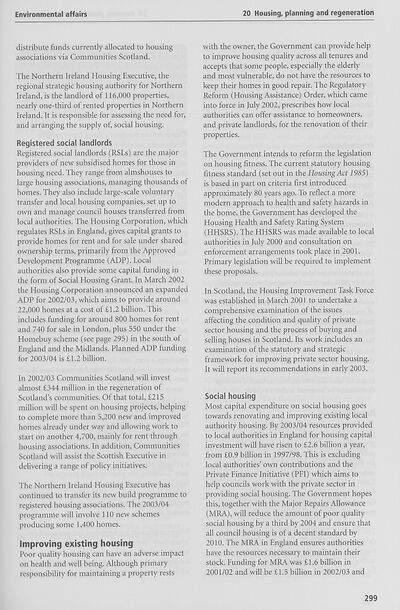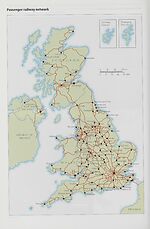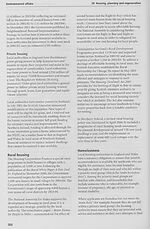Download files
Complete book:
Individual page:
Thumbnail gallery: Grid view | List view

Environmental affairs
20 Housing, planning and regeneration
distribute funds currently allocated to housing
associations via Communities Scotland.
The Northern Ireland Housing Executive, the
regional strategic housing authority for Northern
Ireland, is the landlord of 116,000 properties,
nearly one-third of rented properties in Northern
Ireland. It is responsible for assessing the need for,
and arranging the supply of, social housing.
Registered social landlords
Registered social landlords (RSLs) are the major
providers of new subsidised homes for those in
housing need. They range from almshouses to
large housing associations, managing thousands of
homes. They also include large-scale voluntary
transfer and local housing companies, set up to
own and manage council houses transferred from
local authorities. The Housing Corporation, which
regulates RSLs in England, gives capital grants to
provide homes for rent and for sale under shared
ownership terms, primarily from the Approved
Development Programme (ADP). Local
authorities also provide some capital funding in
the form of Social Housing Grant. In March 2002
the Housing Corporation announced an expanded
ADP for 2002/03, which aims to provide around
22,000 homes at a cost of £1.2 billion. This
includes funding for around 800 homes for rent
and 740 for sale in London, plus 550 under the
Homebuy scheme (see page 295) in the south of
England and the Midlands. Planned ADP funding
for 2003/04 is £1.2 billion.
In 2002/03 Communities Scotland will invest
almost £344 million in the regeneration of
Scotland’s communities. Of that total, £215
million will be spent on housing projects, helping
to complete more than 5,200 new and improved
homes already under way and allowing work to
start on another 4,700, mainly for rent through
housing associations. In addition, Communities
Scotland will assist the Scottish Executive in
delivering a range of policy initiatives.
The Northern Ireland Housing Executive has
continued to transfer its new build programme to
registered housing associations. The 2003/04
programme will involve 110 new schemes
producing some 1,400 homes.
Improving existing housing
Poor quality housing can have an adverse impact
on health and well being. Although primary
responsibility for maintaining a property rests
with the owner, the Government can provide help
to improve housing quality across all tenures and
accepts that some people, especially the elderly
and most vulnerable, do not have the resources to
keep their homes in good repair. The Regulatory
Reform (Housing Assistance) Order, which came
into force in July 2002, prescribes how local
authorities can offer assistance to homeowners,
and private landlords, for the renovation of their
properties.
The Government intends to reform the legislation
on housing fitness. The current statutory housing
fitness standard (set out in the Housing Act 1985)
is based in part on criteria first introduced
approximately 80 years ago. To reflect a more
modern approach to health and safety hazards in
the home, the Government has developed the
Housing Health and Safety Rating System
(HHSRS). The HHSRS was made available to local
authorities in July 2000 and consultation on
enforcement arrangements took place in 2001.
Primary legislation will be required to implement
these proposals.
In Scotland, the Housing Improvement Task Force
was established in March 2001 to undertake a
comprehensive examination of the issues
affecting the condition and quality of private
sector housing and the process of buying and
selling houses in Scotland. Its work includes an
examination of the statutory and strategic
framework for improving private sector housing.
It will report its recommendations in early 2003.
Social housing
Most capital expenditure on social housing goes
towards renovating and improving existing local
authority housing. By 2003/04 resources provided
to local authorities in England for housing capital
investment will have risen to £2.6 billion a year,
from £0.9 billion in 1997/98. This is excluding
local authorities’ own contributions and the
Private Finance Initiative (PEI) which aims to
help councils work with the private sector in
providing social housing. The Government hopes
this, together with the Major Repairs Allowance
(MRA), will reduce the amount of poor quality
social housing by a third by 2004 and ensure that
all council housing is of a decent standard by
2010. The MRA in England ensures authorities
have the resources necessary to maintain their
stock. Funding for MRA was £1.6 billion in
2001/02 and will be £1.5 billion in 2002/03 and
299
20 Housing, planning and regeneration
distribute funds currently allocated to housing
associations via Communities Scotland.
The Northern Ireland Housing Executive, the
regional strategic housing authority for Northern
Ireland, is the landlord of 116,000 properties,
nearly one-third of rented properties in Northern
Ireland. It is responsible for assessing the need for,
and arranging the supply of, social housing.
Registered social landlords
Registered social landlords (RSLs) are the major
providers of new subsidised homes for those in
housing need. They range from almshouses to
large housing associations, managing thousands of
homes. They also include large-scale voluntary
transfer and local housing companies, set up to
own and manage council houses transferred from
local authorities. The Housing Corporation, which
regulates RSLs in England, gives capital grants to
provide homes for rent and for sale under shared
ownership terms, primarily from the Approved
Development Programme (ADP). Local
authorities also provide some capital funding in
the form of Social Housing Grant. In March 2002
the Housing Corporation announced an expanded
ADP for 2002/03, which aims to provide around
22,000 homes at a cost of £1.2 billion. This
includes funding for around 800 homes for rent
and 740 for sale in London, plus 550 under the
Homebuy scheme (see page 295) in the south of
England and the Midlands. Planned ADP funding
for 2003/04 is £1.2 billion.
In 2002/03 Communities Scotland will invest
almost £344 million in the regeneration of
Scotland’s communities. Of that total, £215
million will be spent on housing projects, helping
to complete more than 5,200 new and improved
homes already under way and allowing work to
start on another 4,700, mainly for rent through
housing associations. In addition, Communities
Scotland will assist the Scottish Executive in
delivering a range of policy initiatives.
The Northern Ireland Housing Executive has
continued to transfer its new build programme to
registered housing associations. The 2003/04
programme will involve 110 new schemes
producing some 1,400 homes.
Improving existing housing
Poor quality housing can have an adverse impact
on health and well being. Although primary
responsibility for maintaining a property rests
with the owner, the Government can provide help
to improve housing quality across all tenures and
accepts that some people, especially the elderly
and most vulnerable, do not have the resources to
keep their homes in good repair. The Regulatory
Reform (Housing Assistance) Order, which came
into force in July 2002, prescribes how local
authorities can offer assistance to homeowners,
and private landlords, for the renovation of their
properties.
The Government intends to reform the legislation
on housing fitness. The current statutory housing
fitness standard (set out in the Housing Act 1985)
is based in part on criteria first introduced
approximately 80 years ago. To reflect a more
modern approach to health and safety hazards in
the home, the Government has developed the
Housing Health and Safety Rating System
(HHSRS). The HHSRS was made available to local
authorities in July 2000 and consultation on
enforcement arrangements took place in 2001.
Primary legislation will be required to implement
these proposals.
In Scotland, the Housing Improvement Task Force
was established in March 2001 to undertake a
comprehensive examination of the issues
affecting the condition and quality of private
sector housing and the process of buying and
selling houses in Scotland. Its work includes an
examination of the statutory and strategic
framework for improving private sector housing.
It will report its recommendations in early 2003.
Social housing
Most capital expenditure on social housing goes
towards renovating and improving existing local
authority housing. By 2003/04 resources provided
to local authorities in England for housing capital
investment will have risen to £2.6 billion a year,
from £0.9 billion in 1997/98. This is excluding
local authorities’ own contributions and the
Private Finance Initiative (PEI) which aims to
help councils work with the private sector in
providing social housing. The Government hopes
this, together with the Major Repairs Allowance
(MRA), will reduce the amount of poor quality
social housing by a third by 2004 and ensure that
all council housing is of a decent standard by
2010. The MRA in England ensures authorities
have the resources necessary to maintain their
stock. Funding for MRA was £1.6 billion in
2001/02 and will be £1.5 billion in 2002/03 and
299
Set display mode to:
![]() Universal Viewer |
Universal Viewer | ![]() Mirador |
Large image | Transcription
Mirador |
Large image | Transcription
The item on this page appears courtesy of Office for National Statistics and may be re-used under the Open Government Licence for Public Sector Information.
| Britain and UK handbooks > UK: The official yearbook of the United Kingdom of Great Britain and Northern Ireland > 2003 > (337) |
|---|
| Permanent URL | https://digital.nls.uk/204927491 |
|---|
| Attribution and copyright: |
|
|---|---|
| Description | Three volumes of 'UK: The official yearbook of the United Kingdom of Great Britain and Northern Ireland', published annually by the Office of National Statistics from 2002-2005. |
|---|---|
| Shelfmark | GII.11 SER |
| Description | Three titles produced by the British Government from 1954-2005 describing 'how Britain worked'. They are: 'Britain: An official handbook' (1954-1998), 'Britain: The official yearbook of the United Kingdom' (1999-2001), and 'UK: The official yearbook of the United Kingdom of Great Britain and Northern Ireland' (2002-2005). These 50 reports provide an overview of Britain's economic, social and cultural affairs, its environment, international relations, and the systems of government. They give an impartial summary of government policies and initiatives, and explain how public services are organised. |
|---|---|
| Additional NLS resources: |
|

